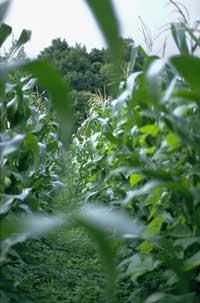Does biotechnology benefit or to the detriment of agriculture?
Just look at the hamlets of Euskal Herria to see how much agriculture has changed in recent years. Currently there is no laboratory agriculture in the liver and it can be too late to discard the contributions of biotechnology.
Genetically modified plants are the ones that occur to us nothing more to mention biotechnology, but it is much more than this. Biotechnology consists of the use of biological organisms and processes for the manufacture and conservation of food. Since the nature and functioning of nucleic acids (DNA and RNA) were clarified in the 1950s, new doors of manipulation were opened in the elements that make up living organisms. Thanks to these discoveries, biotechnology has gone beyond sexual compatibility to achieve ‘hybridization’.

In the agricultural sector (including forestry and fisheries), the applications of biotechnology have allowed the creation of new species that could not be formed naturally, as well as insect resistant plants, all of them genetically modified plants and animals. Cloning, that is, individuals with the same genetic information are increasingly used and some of them are already patented.
Why biotechnology?
Biotechnology has been used to achieve opposing goals. First, biotechnology has been a way to improve the profitability of agriculture in developed countries. In this sense, laboratory work has given rise to species more resistant to certain pathologies, species that arrive faster to sexual maturity or never arrive (such as trouts and salmon), herbicides and increasingly effective pesticides, complex foods adapted to each species, plants adapted to new conditions, etc.
But biotechnology has other challenges. For example, laboratory work aims to protect indigenous species in developing countries, and with the intention of turning them into fuels there is the idea of converting cereals into plastic matter. Many of the microorganisms used for biological recovery of contaminated soil or water are also genetically modified. It is clear, therefore, that biotechnology is a field with many avenues of research and that many of its research aims at concrete applications.
Among the benefits there are experts who claim that biotechnology is a way to reduce hunger in the world. And it is true that biotechnology has allowed to increase production and adapt some species to the new conditions. For example, plants have been developed that grow in acidic soils (40% of the world's cultivable soils are acidic) or basic (more than 25%). But we must not forget that all these magical formulas are hidden in the laboratories of the developed countries and therefore, as always, are in the hands of a few.
According to Mertxe de Renobales, professor at the UPV/EHU School of Pharmacy, "finding a solution to this problem is very complex and the solution must be integrated. The FAO report forecasts that by 2050 there will be 9 billion inhabitants worldwide, of which 7 billion will be inhabitants of the Third World. According to the same report, increased production is essential, especially in those countries where food is insufficient. If in 2050 crop productivity is the same as in 1997, planting will require an additional 1.6 billion hectares (currently 1.5 billion hectares are cultivated), for which massive deforestation would have to be carried out.

From a scientific and technical point of view, transgenic plants can help solve this situation. I say they can help because you don't have to lose sight of the key to everything and therefore other solutions are needed."
Biotechnology and security
All these manipulations in laboratories that are made with food products cause a panic in the Western consumer and, since many questions remain pending, this distrust is reasonable to some extent. In the words of Mertxe de Renobales Scheifler, "there can be many legitimate opinions on this point; while Western consumers are concerned about allergy issues, people in developing countries may be interested in increasing crop productivity."
However, according to Mertxe de Renobales Scheifler, "GM crops filter controls that do not support improved harvests with conventional methods before their marketing. In addition, they are accepted individually and never by groups (for example, all Bt corn). Keep in mind that zero risk does not exist and know that if we applied the same controls and strict criteria to supermarket products or pharmacies, the shelves could be semi-skimmed. Of course, we have to keep researching allergy, as there are aspects that need more information, and this is advised by the National Academy of Sciences of the United States and the Royal Society of the United Kingdom."
It is also surprising the disparity of the changes produced by biotechnology that consumers receive from one country to another. For example, in the United States genetically modified species are taken normally, while in Europe they are the ones that generate the most mistrust. On the contrary, the bacteria used in France to produce cheese scare in the United States.
It is clear that research is much faster than consumer habits, laws and health studies, so opinions about biotechnology are very conflicting. All this is not easy to take measures, but in the meantime, as a reader, the time to cook legumes with a pleasant smell, and good!
Published in the supplement Estación de Gara.
Buletina
Bidali zure helbide elektronikoa eta jaso asteroko buletina zure sarrera-ontzian











